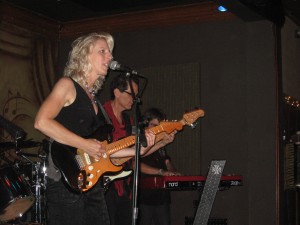The Zen answer is “forever.” That runs counter to our culture of instant gratification, which leads you to believe you could be a “rock star” overnight (just learn a few chords). I believe music is a spiritual path that one follows, ideally, without regard to any destination. I know of no creative activity that one can truly master. The great painters, writers, composers, musicians were always striving to develop their art and scorned the notion that they had “arrived”–regardless of any public acclaim they might have received.
When I started taking guitar lessons, I naively imagined that learning to play wouldn’t be as challenging as it has been. I don’t know if I had a specific time line in my head, but I didn’t realize how much there was to learn. Even after more than two years, it feels like I’m still at the awkward toddler stage, at best.
I recently ran across two different sources that mentioned a more proximate time frame. In a 2004 interview with Bill Wyman, Muddy Waters’ son, Big Bill Morganfield said that after his father’s death (April 30, 1983) he wanted to do a tribute to him. He bought a a guitar for himself and for his brother Joseph. “I knew my dad was great, but I didn’t realize how great he was until I tried learning how to play the same stuff he was playing,” Morganfield said. “It took me eight years or so to even get within the ball park of being good enough.” (This interview is one of the extras on the concert DVD Muddy Waters: Messin’ with the Blues [1974].)
In a 1994 interview with Guitar World, Hubert Sumlin said that he had been playing guitar for eight or nine years when he approached Howlin’ Wolf and wanted to play with his band. Wolf said he wasn’t ready. Sometime after Sumlin went home, he had a realization that he didn’t need to play with a pick. “I started playing with a lot more soul. I never used a pick again. My tone, my sound, everything happened right then,” he said.
I can’t even guess how my playing may have progressed after eight years (That’s 2016!). So much depends on how much and how well I practice each day.
In his book, Zen Guitar (1997), Philip Toshio Sudo (1959-2002) says that when beginning students ask how long it will take to learn, he tells them “as long as you live.” He adds, “The Way of Zen Guitar is learned day by day, minute by minute, second by second, now to eternity. There is no faster way.”
George Leonard drew on his knowledge of Zen philosophy and the martial art of aikido in writing his book, Mastery: The Keys to Success and Long-Term Fulfillment (1992). He stresses that mastery “brings rich rewards, yet is not really a goal or a destination but rather a process, a journey.” He says the best way to move toward mastery is to “practice diligently,” but also to “practice primarily for the sake of the practice itself.”
I’m committed to the path of music and plan to continue playing guitar as long as I’m physically able to. I’ll do my best to accept that it will take “forever” and focus on the present moment and what I’m able to play in it and to play that with all my heart.
